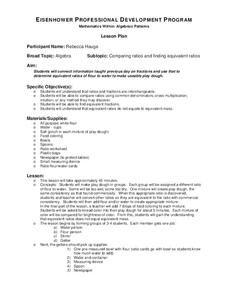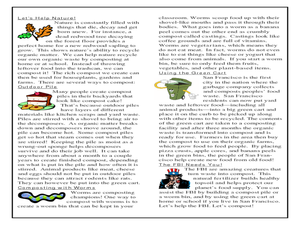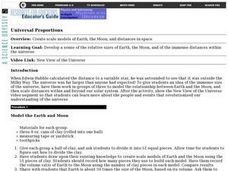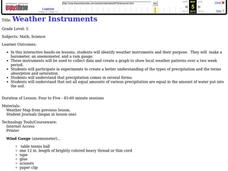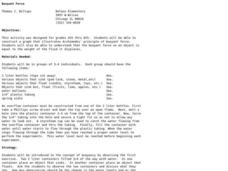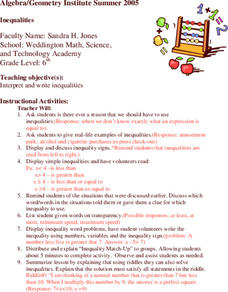Curated OER
A Mass of Pennies
Learners estimate and determine the number of cents (pennies) that are needed to equal the mass of a variety of common objects. They develop a process for measuring and explore concepts related to units of measurement.
Curated OER
Vector Lab
Here is a math lab that helps young mathematicians understand the real-life meaning for vector addition. By building a model using spring scales and washers as weight, and then calculating the vector addition using two different methods,...
Curated OER
Critical Thinking Strategies
Teach your readers to be critical thinkers. A strategy is outlined that can be used to compare and contrast entities. An example lists four states. The learner removes one state that "does not belong" in the list for some reason, and...
Curated OER
Would You Believe Your Eyes?
Students study the parts and functions of the human eye. They create dodecagons which are twelve-sided figures with twelve equal angles and share these with the class so that each student can begin to see how many different illusions can...
Curated OER
Mathematics Within: Algebraic Patterns
Learners comprehend that ratios and fractions are interchangeable. They compare ratios using common denominators, cross multiplication, and intuition. Students find equivalent fractions. They comprehend that equivalent ratios do not...
Curated OER
Let's Build a Worm Bin
Students explore the process of decomposition. In this ecology and measurement lesson, students prepare a worm home to be used for vermicomposting. Students weigh a group of worms and the added food, recording this information on a data...
Teach Engineering
What a Drag!
Stop and drop what is in your hand! Pupils investigate how form effects drag in the 12th part of a 22-part unit on aviation. Groups create equally weighted objects and determine which one falls the fastest by collecting data.
Curated OER
Universal Proportions: Earth and Moon
Students create scale models of Earth, the Moon, and the distances within the universe. Working in groups, they construct their models of Earth and the Moon on a scale of 50:1 and calculate how far apart to place their models. They...
Curated OER
How Big Are Earth, Sun, and Moon?
Third graders draw what they believe is in space on a dry erase board. In groups, they are given a beaker half filled with water and they add a teaspoon of oil, observing the different layers that form. To end the lesson, they identify...
Curated OER
Are You a Golden Ratio?
Students explore the concept of the golden ratio in nature and architectural design. They discuss examples such as petals on a sunflower and the Parthenon. In small groups they take turns measuring their body parts to find a golden ratio.
Curated OER
Playing In The Dirt - Discovering Soil
Young scholars discuss some the different types of soil in Oklahoma. They identify the soil types and explore the characteristics of each type of soil. In groups, students perform hands-on activities such as taking soil samples,...
Curated OER
Climate and Periodic Functions: Science & Math Integration
High schoolers complete a lab that introduce the scientific concept of climate on Earth. Following the lab, they complete further research on climate. Using average monthly temperatures students construct a mathematical model and analyze...
Curated OER
Weather instruments
Learners explore weather instruments. In this weather lesson, students make rain gauges, anemometers, and barometers following the instructions given in the lesson. Learners set up a weather station using their instruments and record and...
Curated OER
Planning a Garden Using a Grid
Third graders plan for a garden. In this garden planning lesson plan, 3rd graders investigate the use of a grid to accurately map out and plan for a vegetable garden. Students predict the space requirements for different vegetables.
Curated OER
Buoyant Force
Students illustrate Archimedes' Principle of Buoyant Force. In this graphing activity, students will observe that the buoyant force on an object is equal to the weight of the fluid it displaces. Students will then create a graph showing...
Curated OER
You, Me and UV
Students explore the validity of claims of UV protection. Students research UV rays and the cancer danger presented by these rays. Working in groups, they perform tests on sunglass and sunscreen products to determine if their claim of UV...
Curated OER
Inequalities
Sixth graders explore the concept of inequalities and how to solve them in the realm of integers. The instructor would benefit from using a number line and reviewing integers before using this lesson.
Curated OER
Grams and Kilograms
Fourth graders participate in scavenger hunts for objects that weigh a gram and a kilogram. In this metric measure lesson, 4th graders use a spring scale to measure objects they believe weigh a gram and a kilogram. Students complete...
Curated OER
Collapsing Gas Clouds-Stability
In this collapsing gas clouds learning exercise, students read about the Bok Globules seen by the Hubble Space Telescope. They use a given equation indicating the pressure of a gas sphere and determine at what minimum radius the cloud...
Curated OER
Tessellations
Students identify and construct figures that tessellate. They investigate which regular polygons tessellate and how to modify them to make other tessellating figures. Students explore how naturally occurring tessellations have been...
Curated OER
Measuring the Earth
Students use principles of geometry to measure the circumference of the Earth. In this applied geometry lesson, students use mathematics to determine scientific information. They make measurements, calculate the central angle, and...
Curated OER
Oscillations
Students construct and compare the actions of various pendulums. In this pendulum motion lesson, students build and test different types of pendulums. They conduct experiments with the length of the swing arm and apply mathematical...
Curated OER
Communication Satellites
In this communication satellites worksheet, students complete a table showing the satellite, the lifespan of the satellite, the number of transponders on the satellite and the cost of the satellite. Students determine the retire year,...
Curated OER
Making Hypotheses
Fourth graders practice making hypotheses about what they believe occur as they perform an osmosis experiment in class. This experiment is designed to illustrate how important it is to make an accurate hypothesis.




